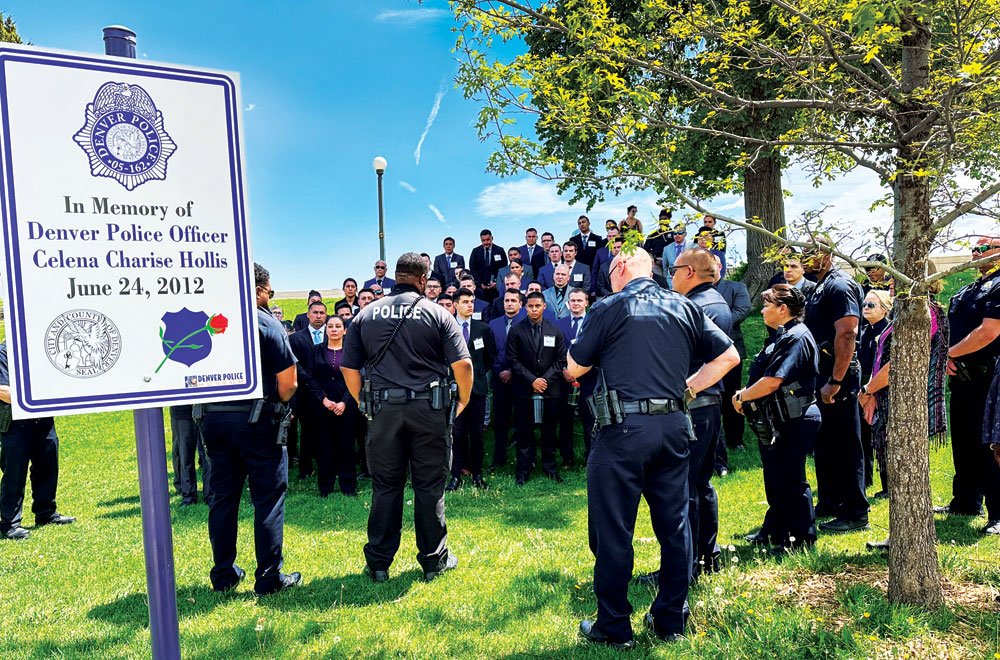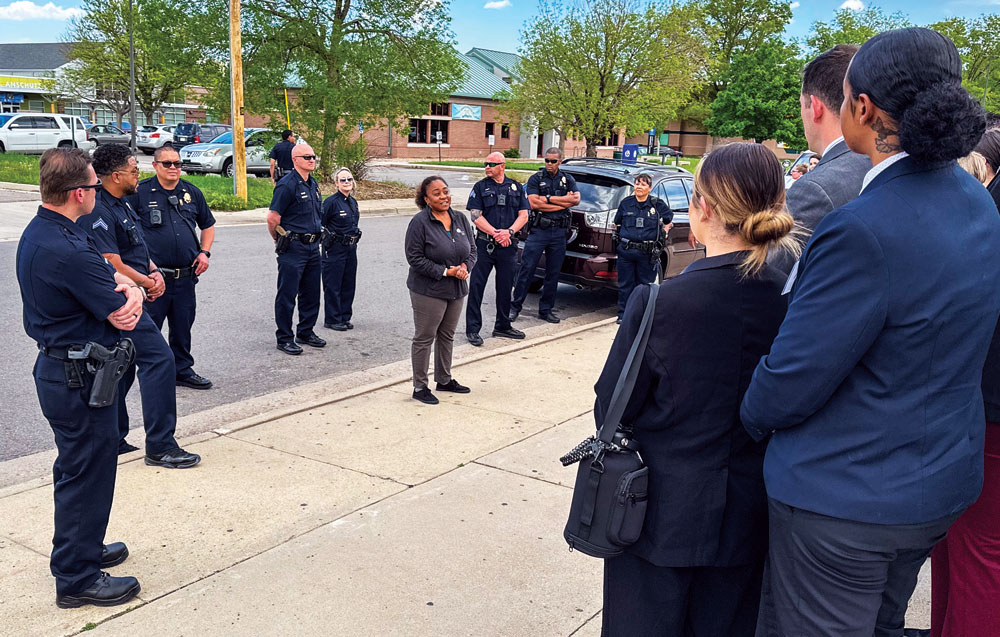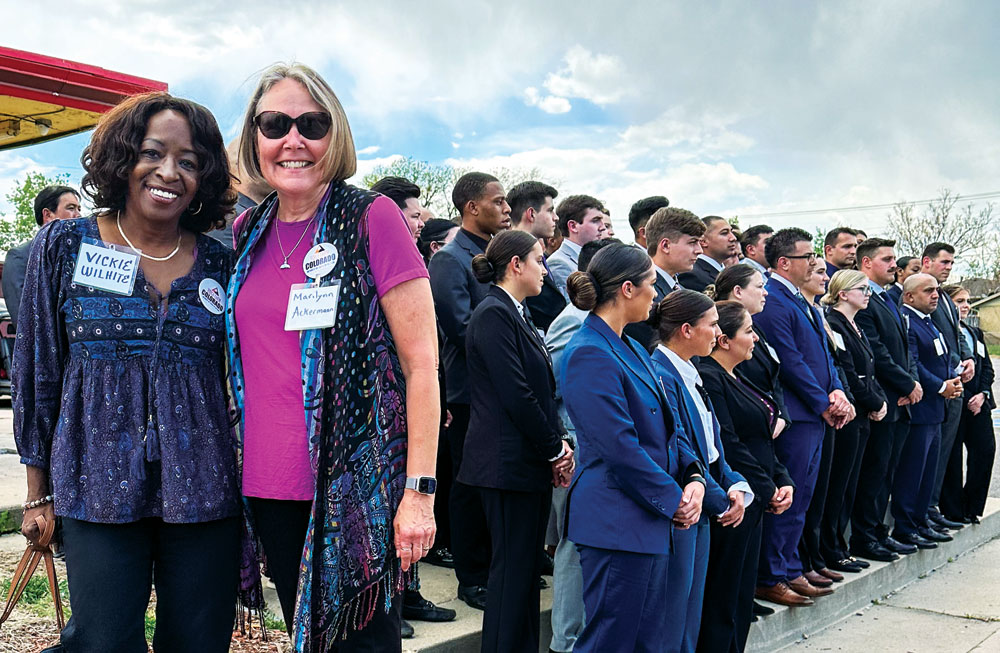
New Denver Police Department recruits listen to Detective Tevonnon Jones recount how his partner was killed at this spot while they both were patrolling a City Park Jazz concert in 2012. The field trip was part of a new training called “Before the Blue & Beyond the Badge” designed to introduce recruits to Denver communities and learn life skills from veteran officers.
On a recent Wednesday in May, more than four dozen police recruits stood outside the Blazing Chicken Shack in Park Hill listening to owner Rhonda Banks talk about how she and other small business owners have felt ignored by the Denver Police Department over the years. She described an incident when a patron’s car was stolen but police officers never arrived to talk to the victim. “Know that when we call you, we’re calling for a reason.” She urged the recruits to stop in at her restaurant just to say hello when they are in the area. Leslie Williams, senior librarian at the nearby Pauline Robinson Library, had a similar message. “If you’re in the area, stop in and talk to the kids who are in the library. Get to know them.”

Librarian Leslie Williams tells new police recruits to stop in at the Pauline Robinson Library in Park Hill to meet and make connections with the young people who hang out there.
It was an invitation the new recruits heard again and again as they visited neighborhoods all over Denver as part of a brand-new program initiated by Police Chief Ron Thomas called “Before the Blue and Beyond the Badge.” Thomas modeled it after a pilot program in Seattle that tries to create better relationships between police officers and community members. “I thought there would be some pretty significant value [for the new recruits] to learn about cultures and various communities, and some of the challenges that exist between communities and police, reasons for distrust, and historical context,” says Thomas.
The class is taught the very first week of the police academy to emphasize the importance of building those relationships. The first workshop was led by two leaders from Together Colorado, a faith-based grassroots organization that has often been critical of the Denver Police Department. Central Park resident Marilynn Ackermann, one of the group’s facilitators, says she was shocked but very pleased when she received the invitation to teach the new recruits. “We want to be part of the team. We want to be part of their learning and what molds them. We want to change the face of policing from the old days.”

Vickie Wilhite and Marilynn Ackermann, from “Together Colorado,” have criticized police in the past. Now they are partnering with DPD to teach recruits about the importance of establishing relationships with communities they police.
Ackermann says she and Vickie Wilhite started their class by talking about the history of racism in the nation and how that has influenced policing. They taught about the history of the Ku Klux Klan in Denver and then brought the discussion forward to how ill-prepared the Denver Police Department had been in handling the protests that followed the killing of George Floyd. “We wanted them to really understand why so many communities don’t trust the police,” says Wilhite.
Both women ended up spending the entire week with the recruits, watching them meet community leaders and listening to veteran officers talk about things they had learned over the years. They say they were impressed by how open and vulnerable the officers were during the discussions. “We thought we were going to be the only ones talking about the importance of building relationships, and nearly everyone who spoke emphasized relationships,” says Ackermann.
On the day that the recruits spent in Police District 2 in Northeast Denver, Sgt. Nate Beiriger asked recruits to talk about any negative experiences they had with police in the past. New recruit Madison Gibbs described how she had been sexually assaulted several years ago and the police officer who was assigned to the case didn’t seem to take her story seriously and didn’t keep her informed about the progress of her case. Beiriger listened empathetically and then used it as a teaching moment. “We need to avoid taking a victim of a crime and turning them into another victim at the hands of the police department.” He then added, “You don’t have the option of having a bad day and taking it out on the community. What you do impacts lives and people will remember-–-good and bad.”
After the class, Gibbs said that she had always been interested in criminology, but her assault—and the way she was treated by the police—acted as a catalyst for her to become a police officer. She thinks the Beyond the Badge training will be very helpful for the way policing is conducted in the future. “All of the stories we’ve heard really reinforce the idea that everybody is going through something and that you really need to have empathy when dealing with members of the community.”
Central Park resident and new recruit Katie Bonawitz agrees. She says she was especially grateful for the lessons shared by the officers with decades of experience. “It’s nearly impossible to wrap my head around how much wisdom has been given to us.” She believes the officers provided concrete ways to connect with the community they are policing. “One officer said he didn’t know for the first 12 years to regularly go to community meetings. He told us not to make that mistake.”
Chief Thomas says that he will solicit feedback from both the new recruits and community members about ways to enhance and improve Beyond the Badge going forward. He already thinks they should extend the training a few more days. He says he doesn’t have specific benchmarks to judge whether the program is a success, but ultimately he hopes the recruits will develop a real understanding and love of the neighborhoods they are assigned to police. “We really would prefer that our interactions with the public always be positive. We know that’s not always going to be the case, but if the majority of our interactions with the public are positive and not always enforcement-based, I think that is going to go towards improving our relationship with the community overall.”
Community activist Wilhite says she was impressed with what she saw from this initial training. “I have real hope now. And I think going forward, we’re going to be making real relationships and partnerships with police officers.”
Front Porch photos by Christie Gosch


0 Comments